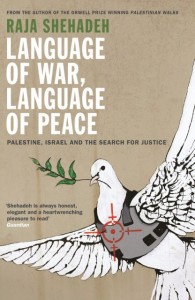Raja Shehadeh
Profile Books, 2015, 150 pages, £9.99
Published last month, Raja Shehadeh’s new book, Language of War, Language of Peace, is a reflection on Edward Said’s interest in culture, language, and politics. This book is the culmination of the accomplished, scholarly work of an experienced jurist, humanist, and clearly gifted writer.
Known for his enduring positivity, Shehadeh stretches his optimism to the limits, exploring the theme of language and its misuse in an attempt to test its relevance regarding the main turning points of the Palestine-Israel conflict. In his own words, he was guided by “Edward [Said’s] often-repeated aphorism, borrowed from Antonio Gramsci: ‘Pessimism of the intellect, optimism of the will’.”
 He writes subjectively on the wars of 1948 and 1967 and, later, he challenges the “goodness” of the wall, not just as a lawyer but also as a neighbor. Shehadeh goes on to critically reflect upon the dynamics of the peace process, from Oslo to the final round of failed negotiations under the supervision of John Kerry, using his knowledge of the internal affairs and procedures. He also provides a necessarily current, timely, and accurate analysis of the recent violence experienced in Jerusalem, as well as the summer 2014 war on Gaza. All throughout the book, references and numbers are provided, as well as extensive notes at the end of the book, making it not just a very informative volume but also a comprehensively written one.
He writes subjectively on the wars of 1948 and 1967 and, later, he challenges the “goodness” of the wall, not just as a lawyer but also as a neighbor. Shehadeh goes on to critically reflect upon the dynamics of the peace process, from Oslo to the final round of failed negotiations under the supervision of John Kerry, using his knowledge of the internal affairs and procedures. He also provides a necessarily current, timely, and accurate analysis of the recent violence experienced in Jerusalem, as well as the summer 2014 war on Gaza. All throughout the book, references and numbers are provided, as well as extensive notes at the end of the book, making it not just a very informative volume but also a comprehensively written one.
“And indeed language continues to reveal how censorious Israeli leaders were, even of Palestinians’ dreams. During the course of the negotiation a message sent by prime minister Benjamin Netanyahu to US secretary of State John Kerry, included a YouTube video of the popular Palestinian vocalist Mohammed Assaf dubbed Mahboub Al-Arab (beloved by the Arabs), who won first place in the popular TV contest, Arab Idol, and was later made a goodwill ambassador for UNRWA…Israel considered the way Assaf sang longingly about cities in Israel that were once Palestinian an incitement.”
In reading this beautifully written book, you are left without doubt that this is perhaps one of Shehadeh’s most angry and despairing writings. It is so telling to see a writer known for his passion, love, and optimism, writing bleak truths with smaller margins left for hope than ever before. Raja Shehadeh finds this hope in the growing BDS movement, or the “counter-boycott” as he calls it. Drawing inspiration from Archbishop Desmond Tutu, he argues, ”Civil society must step into the breach, as it did in South Africa’s struggle against apartheid.”
This book is perhaps an attempt by one of the most eloquent Palestinian writers to express his anger at the rhetorical use of language itself to stretch narratives, making them fit multiple dimensions of meaning through the possibility of words. Mukharribiin, infiltrators, terrorist, framework, road map, sumoud, aliya, fidayeen, shabab, and Nakba, these are only some of the words that Shehadeh is deconstructing to demonstrate the possible misuse of language, convolution of expression, and the exploitation of words.
Reviewed by: Mahmoud Muna,
The Educational Bookshop, Jerusalem
